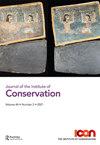保护能力
IF 1
0 HUMANITIES, MULTIDISCIPLINARY
引用次数: 4
摘要
“养护技能”是一个通用的、浮动不定的术语,经常与“手工技能”、“实用技能”、“动手技能”和“处理技能”交替使用。考虑到“处理技能”一词的重要性,本文承认保护处理技能作为一种核心保护能力的功能。它考察了评论的本质,这些评论试图证明,由于缺乏对保护教育中处理技能的关注,这种能力已经降低,反过来,这影响了学生的技能和就业能力。它评估了这一话语发展的证据,并在此过程中考虑了与保护学生和应届毕业生相关的话语的挑衅和后果性。文章的结论是,保护作为一门成熟的学科和专业,是由技术、社会和知识的多元化所定义的,这是保护教育在21世纪发展的更现实的挑战。本文章由计算机程序翻译,如有差异,请以英文原文为准。
Conservation skills
Abstract The term ‘conservation skills’ is a generic, and somewhat free-floating term, that is often used interchangeably with ‘manual skills’, ‘practical skills’, ‘hands-on skills’ and ‘treatment skills’. Giving weight to the term ‘treatment skills’, this article acknowledges the function of conservation treatment skills as a core conservation competency. It examines the nature of commentary that has sought to demonstrate that this competency has been reduced by a lack of focus on treatment skills in conservation education and, in turn, that this affects student skills and employability. It assesses the evidence on which this discourse has been developed, and in doing so considers the provocative and consequential nature of the discourse as it relates to conservation students and recent graduates. The article concludes that conservation, as a maturing discipline and profession, is defined by a technical, social and intellectual pluralism, and that this is more realistically the challenge for conservation education to advance in the twenty-first century.
求助全文
通过发布文献求助,成功后即可免费获取论文全文。
去求助
来源期刊

Journal of the Institute of Conservation
HUMANITIES, MULTIDISCIPLINARY-
CiteScore
1.50
自引率
0.00%
发文量
22
期刊介绍:
The Journal of the Institute of Conservation is the peer reviewed publication of the Institute of Conservation (Icon). As such, its aims reflect those of Icon, to advance knowledge and education in conservation and achieve the long term preservation and conservation of moveable and immoveable cultural heritage. The Journal provides a collective identity for conservators; it promotes and supports both the profession and professionalism. With international contributions on all aspects of conservation, it is an invaluable resource for the heritage sector. The specific aims of the Journal are to: 1. promote research, knowledge and understanding of cultural heritage conservation through its history, practice and theory 2. provide an international forum to enable and disseminate advances in research, knowledge and understanding relating to conservation and heritage 3. champion and support professional standards of heritage conservation in the UK and internationally 4. provide a permanent record of issues relating to conservation and heritage 5. be financially and operationally sustainable. To achieve these aims, the Journal invites contributions from all those involved in the conservation of cultural heritage and related activities. Areas of interest include understanding cultural heritage materials and their degradation; subject reviews and histories of cultural heritage materials and conservation treatments; new, innovative or improved approaches to conservation and collections care theory, practice, communication, management and training; case studies demonstrating new, innovative or improved approaches; and conservation in its wider context. Submitters are encouraged to demonstrate how their work is of practical application to conservation. To maintain professional standards and promote academic rigour, submissions of articles and shorter notices are subject to an anonymous peer review process.
 求助内容:
求助内容: 应助结果提醒方式:
应助结果提醒方式:


